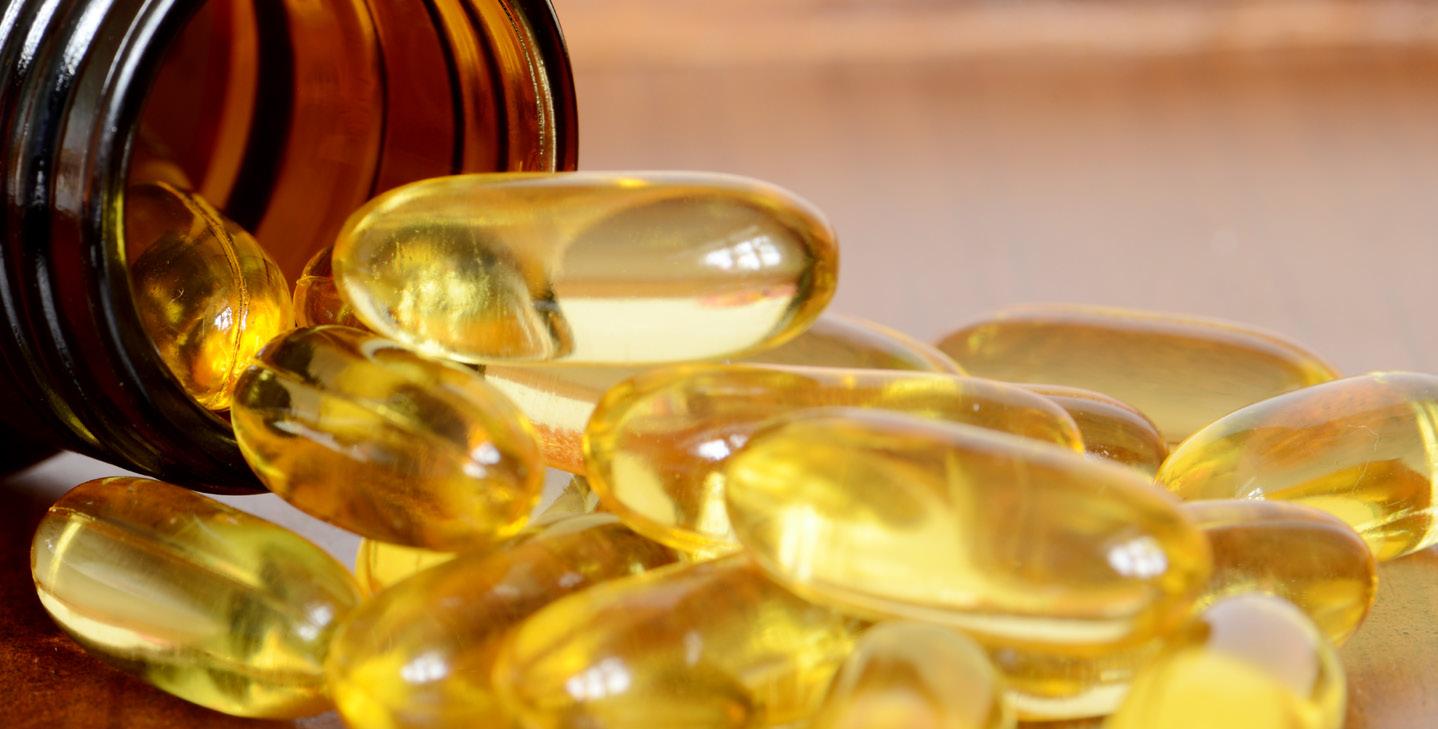
4 minute read
Supplements to Support Vision
Dietary supplements to support eye health have gained traction among healthcare providers and eye specialists. But not every supplement is the same
By Deborah Jeanne Sergeant
Advertisement
If you experience vision problems or feel concern that you could, a dietary supplement may be helpful. However, it’s not as easy as popping a pill every day.
Not every supplement is as good as another. And supplements for vision can have different uses.
Dietary supplements to support eye health have gained traction among healthcare providers and eye specialists with good reason, as larger bodies of evidence have emerged supporting the helpfulness of eye supplements. Laura Vreeland, registered dietitian at Syracuse VA Medical Center, said that some of her patients’ eye doctors have recommended dietary supplements for supporting eye health.
“It’s different of what’s in your regular multivitamin,” she said.
Most stores carry general “eye support” formulas in their supplement aisle, but more specific supplements may be more helpful in addressing particular concerns.
Formulas related to macular degeneration have become more popular as research has shown supplements are helpful in slowing the condition. Macular degeneration is a progressive eye condition that causes permanent loss of central vision. More than one in three adults 75 and older will experience macular degeneration. The condition causes deterioration of the central part of the retina at the back of the eye.
Vreeland advised looking for a supplement containing lutein, trans-zeaxanthin and meso-zeaxanthin as active ingredients.
“Fish oil is in another ingredients in eye supplements,” she added.
In addition, she promotes a balanced diet that includes leafy green vegetables, eggs, fish and a variety of fruits to support vision health.
Laurel Sterling, registered dietitian, certified nutritionist and educator with Carlson Laboratories in Canastota, explained why lutein and zeaxanthin are usual
As the first definition of low vision above states, a low vision specialist can’t fully correct the eye condition. What they do is improve the ability to see and, thereby do, with the person’s usable vision by enhancing, magnifying or expanding the peripheral vision.
How Do I Know if I Have Low Vision?
• Do you have a vision condition?
• Are there things that you can no longer do as a result?
• Does not being able to do these things frustrate you?
If the answer to all three of these questions is ‘Yes’, then you would benefit from a low vision consultation. If the answer to any of these questions is ‘No’, you do not have low vision (you may have poor vision.)
Can Young People Have Low Vision?
Yes. Young people can have the following conditions:
• Stargardt disease (juvenile macular degeneration);
• Nystagmus (where the eyes make repetitive, involuntary horizontal movements);
• High astigmatism (causes blurred distance and near vision);
• Congenital cataracts (a rare birth defect);
• Achromatopsia (color deficiency);
• Rod-cone dystrophy;
• Strabismus (crossed eyes);
• Amblyopia (lazy eye);
Things that young people often want to do are see the board better at school (not have to sit in the front row!), drive, and read better.
How Is a Low Vision Exam Different Than a Regular Eye Exam?
At a low vision office appointment, your low vision specialist may conduct a practical low vision evaluation per The Richard Shuldiner, OD and William Feinbloom, OD philosophy & methods of providing low vision care.
– The appointment does not involve eye drops to dilate the eyes
– The doctor uses an eye chart with larger numbers, the Feinbloom low vision chart
– Your doctor will request that you bring samples of activities that you regularly perform (stock market reading material, needlework, etc.)
– The low vision specialist will prescribe tailor-made glasses specific to your vision and what you want to do
Where Can I Find a Low Vision Specialist Near Me?
The International Academy of Low Vision Specialists has a doctor directory on its website — www. ialvs.org. People do not need a doctor referral to make an appointment.
George Kornfeld is an optometrist who has been serving low vision patients for over 50 years. He owns Low Vision Optometry of Western New York, which has locations in Buffalo, Rochester and Syracuse. For more information, call 866-446-2050 or visit www.kornfeldlowvision.com ingredients in vision supplement formulas.

“They are carotenoids, which are found in fruits, vegetables and other foods, and are stored in high amounts in and around the macula,” Sterling said. “Zeaxanthin is the predominant carotenoid found in the center of the macula and lutein is found in higher concentrations in the surrounding retina. They also may increase macular pigment density, which is associated with healthy retinas and vision.”
In addition to promoting healthy retinas and vision, zeaxanthin and lutein are antioxidants. Sterling said that they help protect vision by “filtering and blocking harmful UV sunlight and digital blue light from computers, laptops, tablets, and phones, as well as providing protection stopping oxidative stress and retinal damage from free radicals.”
This action can also help prevent cataracts, a condition that causes clouding on the lens of the eye.
According to the American Optometric Association, “cataracts and age-related macular degeneration are the leading causes of visual impairment and acquired blindness in the US, affecting millions of aging Americans.”
Of course, supplements should not replace eating a balanced diet. The above listed healthful foods should be eaten as reasonable servings as part of a balanced diet low in processed foods, added animal-sourced fat, salt and sugar and moderate in overall calories.
Poor diet, smoking, unmanaged diabetes, obesity and cardiovascular disease raise risk of vision problems such as macular degeneration. Taking care of these issues can help mitigate risk such as genetic predisposition and advanced age. Talk with a healthcare provider about vision concerns and before making changes in diet or taking dietary supplements. Any sudden loss of vision requires immediate medical attention.









